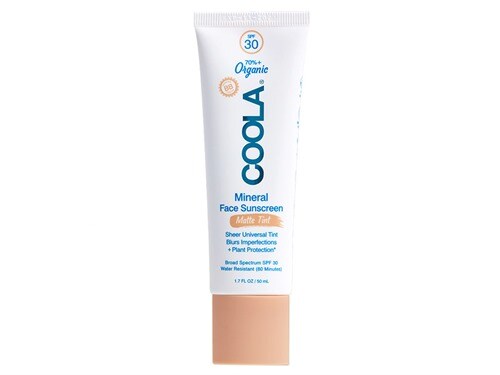

Going lower might not offer enough protection against the sun’s radiation, which can cause skin cancer, especially if you’ll be spending a lot of time outside. Schlessinger recommends sticking with SPF 30 or higher.

Products without oils, fragrances, or para-aminobenzoic acid (PABA) will also help minimize irritation, says Meghan Feely, M.D., a board-certified dermatologist in New Jersey and New York and a clinical instructor in Mount Sinai’s Department of Dermatology. In addition to sun protection, your SPF of choice can include ingredients like hyaluronic acid, ceramides, shea butter, aloe vera, and glycerin for a boost of skin-soothing moisture. As a bonus, these ingredients are considered reef-safe, as they have not yet been found to harm corals. Natural sunscreens are formulated with mineral or physical sunscreen ingredients, like zinc oxide and titanium dioxide, which physically block the sun’s rays from UV damage, as opposed to chemical sunscreens that absorb radiation once it reaches your skin, Dr. Whether you want to avoid dangerous chemicals or simply want to know exactly what you’re putting on your skin, here are the best natural and organic sunscreens that will help protect you from the sun’s harmful rays.įind the active ingredient.


“However, many natural sunscreens work without chemicals to provide great sun protection and coverage,” he continues. That’s not to say that chemical sunscreens are automatically bad, though: The American Academy of Dermatology and the Skin Cancer Foundation agree that the benefits of chemical sunscreens “far outweigh any potential downsides,” says Joel Schlessinger, M.D., a board-certified dermatologist and cosmetic surgeon.
BEST COOLA SUNSCREEN FOR FACE FREE
Because they’re designed to be free of certain chemicals and friendly to sensitive skin, these mineral-based SPFs are worth taking on your next beach trip or hike. Whether you’re concerned with your own health or the well-being of the planet at large, the best natural sunscreens are a safe bet for both your skin and the earth. We updated this article in April 2022 to add more information about each featured product, based on extensive research done by our team (and that of our sister team at the Good Housekeeping Institute).


 0 kommentar(er)
0 kommentar(er)
